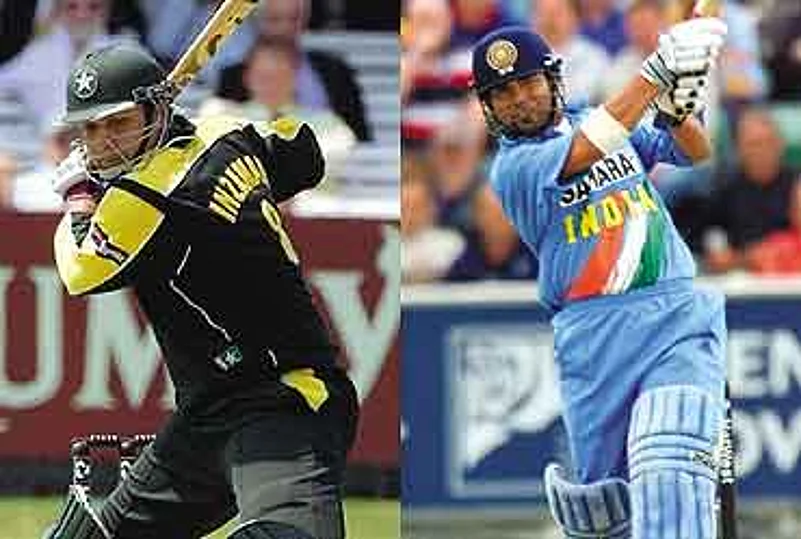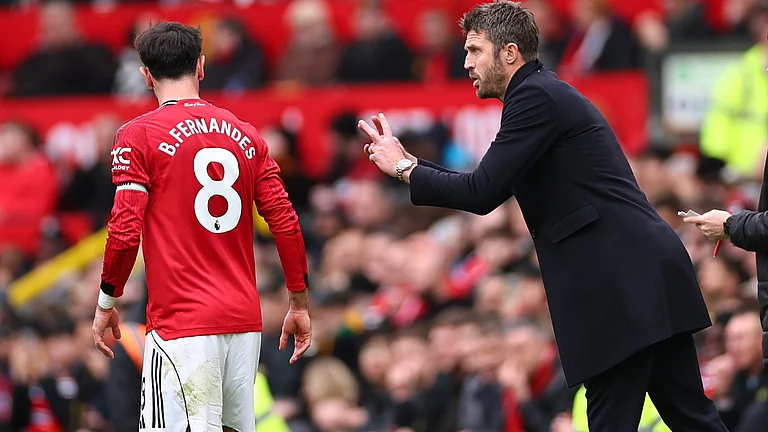Through The Roof
One of the most expensive tours ever in the history of the game began the moment Prime Minister Vajpayee announced at the saarc summit that India will go to Pakistan. Even before Saurav Ganguly showed the courage in Australia to voice the fears of his players on safety grounds, a huge marketing machinery had begun moving. The Pakistan Cricket Board (PCB) charged $1,000 for every bid document. Twenty-nine Indian companies picked up these papers to stake a claim at naming the series after them or their clients, co-sponsoring the event, bagging internet and radio rights and putting up advertisements inside the stadia.
Samsung won the auction for title sponsorship after pledging $4 million to the PCB. (Almost thrice as much as what Sahara paid six years ago to get a tournament in Toronto named the Sahara Cup). Hero Honda bought the co-sponsorship rights of the coming series at $1.5 million. The 20-by-three feet boards around the boundary ropes are today going at $2,00,000 to $3,50,000. To prevent the embarrassment of being swamped by Indian companies, Pakistan gave away only 60 per cent of the in-stadia space in what is called the "unrestricted" category. The rest have been reserved for firms with Pakistani affiliation. But insiders say that the series has become so lucrative that they will not be surprised if the PCB finds various means to sell portions of the restricted space to Indian companies as well.
The PCB has finally seen the colour of money. The impoverished board will make about $20 million out of the series. Ten Sports, which holds the television rights, is expected to earn up to $15 million through the sale of ad spots. It is believed that the channel has sold all the spots for the one-dayers. "Sponsors are not knocking at the door, they breaking it to get in," says Harish Thawani, chief of Nimbus Sport, which won a portion of the in-stadia rights. Sanjay Lal of Percept D’Mark believes, "A lot of emotion is going in. Out of the 4 million American dollars that Samsung will pay for the title sponsorship, at least one million cannot be scientifically accounted for. It was the hype".
In the middle of all this, the Indians earn nothing but a predetermined appearance fee and, of course, free laundry up to an official limit as laid out by the International Cricket Council. So in theory, the Indian board cannot be accused of greed that is disproportionate to the security concerns.

Bang Bang And They
All Come BackIt’s a tour that can end anytime. A crude bomb outside the Indian hotel will bring the curtains down. When the South Africans visited Pakistan last year, a bomb blast in Karachi shrunk the three-Test rubber to a two-match event. But Bangladesh had an uneventful series last year with Shoaib Akhtar as the only safety hazard. In the 2001-02 season, the second Test at Karachi between New Zealand and Pakistan was called off two hours before the start of the match after a car bomb killed 14 people in front of the visitors’ hotel. The Kiwis left at once. Captain Stephen Fleming broke down during a press conference back home, unable to recount the experience of seeing severed limbs strewn on the road. When his team visited Pakistan again, he understandably developed a health problem. Later he told a close Indian friend, "It was very difficult for us to come to terms with what we saw."
A few days ago Jagmohan Dalmiya sent a three-member team to Pakistan to inspect the arrangements made for the Indian side. The team included a security expert from the home ministry. Except for the dispute over Peshawar and Multan as venues, India is said to have expressed confidence in Pakistan’s arrangements. Mohammed Munir, a senior cricket official in Pakistan, reassures all, "It will be a peaceful tour. Elaborate arrangements have been made for the safety of Indian cricketers. There will be security caravans that will take the Indians to the grounds. The grounds themselves will have a space of 10 to 20 yards between the boundary ropes and the stands". But nothing will reassure an Indian batsman when he steps into the feverish din of the grounds there. What will go through his mind as he ploughs the crease and looks around? Will he look at the field positions or scan the stands for a hidden sniper? And when India comes to field, will there be a long leg?
Two Great Indians Were Born In Pakistan
Two of the greatest Indian cricketers made their debuts in Pakistan. In 1978-79, under Bishen Singh Bedi, a middle- distance runner called Kapil Dev took his first shaky steps in international cricket. It was not a dramatic series for him. There was no grand announcing of the coming. But it’s obvious that the Indian prayers for a fast bowler were finally answered in the lanky lad who also had a special but historically underrated talent to employ the best golf shots while holding a cricket bat.
In 1989-90, when Krishnamachari Srikkanth led India to Pakistan, there was a 16-year-old boy in the side who was condescendingly encouraged by the nation because of his paltry age. He scored two half-centuries in the Tests at an average of just over 35. In his first ever one-day international he scored a duck. He was caught by Wasim Akram off Waqar Younis. But then, something happened in an abandoned match. An omen that has never been officially recorded. A single over of Abdul Qadir thrust greatness upon Sachin Tendulkar forever. In a duel of no consequence but spectator satisfaction, he hit the famous eccentric spinner for 27 runs in six balls. His power was punishing. His method was humiliating. His talent left no one in doubt. After the match Qadir himself said in a prophesy that will come true, "The lad is a genius. He is going to tear bowlers apart in international cricket for a long time."
Will India discover a new Kapil Dev or a new Sachin Tendulkar in the coming two months, a young man with no LoC on his mind, a man who will shape the game to his own implacable rules? Might seem a bit unlikely, but stranger things have been known to happen when India faces up to Pakistan.
This team will be under tremendous pressure to perform, to win, and if not win, at least not lose (India has never won a Test in Pakistan; four out of five Indian touring captains lost their jobs after their Pakistan trips, and the only one who did not, Sunil Gavaskar, was perhaps helped by the fact that the tour was called off halfway). But this is also the best team India has had for a long time, with a batting line-up to compare with the mid-’80s Gavaskar-Srikkanth-Vengsarkar-Amarnath-Azharuddin-Kapil Dev pantheon. And it is more focused, more fearless and more fervid to win than any other Indian team ever. These guys could break the old jinx.
And as for Sachin, he returns after an era to the land where he was baptised with blood. His fame as high as it was predicted. His record a mere evidential math. His stature so supreme that he is among the most loved people even in Pakistan. But for the first time in many years, he goes into a series with the broad consensus that he is the greatest batsman in world cricket today in serious dispute. He must rise, for, to borrow heavily from Steve Waugh, if not he then who, if not now then when, if not in Pakistan, then where?






















